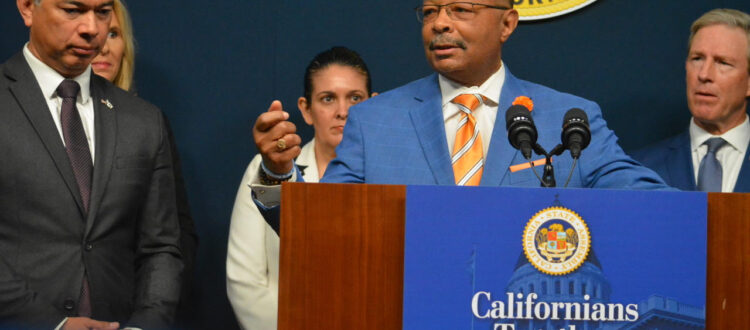Antonio Ray Harvey, Maxim Elramsisy, Lila Brown and Joe W. Bowers Jr.| California Black Media
Hate Incident: White Supremacist Letter to Legislators, AG Bonta Says Black Maternal Deaths Are God’s Will
A member of a White supremacist group wrote a racist letter addressed to members of the California Legislature and Attorney General Rob Bonta claiming deaths of Black mothers and children during childbirth are God’s will.
Earlier this month, the Assembly Committee on Health voted 12 to 2 to advance Assembly Bill (AB) 2319, the California Dignity in Pregnancy and Childbirth Act, legislation crafted to address the high infant mortality among Black women.
Opposing that decision last week, a person claiming to be a member of two racist, White Supremacist organizations sent a letter to the office of Assemblymember Lori D. Wilson (D-Suisun City).
Wilson, Chair of the California Legislative Black Caucus (CLBC), is the author of AB 2319.
“I submit this letter in strong and vehement opposition of AB 2319,” the letter obtained by California Black Media stated. “We believe that every non-White birth in this state is a drain on the taxpayers and that any miscarriage or complication that results in death or defect of the mother, or the child, is God’s way of ensuring population control among Blacks and other minorities.”
Wilson said she and her staff were shocked by the raw hatred expressed in the letter.
“The recent racist opposition to our efforts to secure equitable health care for every Californian is not only offensive but deeply concerning,” stated Wilson.
“As the Chair of the California Legislative Black Caucus, I unequivocally condemn these views, which are steeped in hate and ignorance. The language used in this letter is not only disgraceful but dangerous and has no place in our society or legislative discourse. I want to make it unequivocally clear: there is no place for hate in California.”
Wilson said she and other colleagues opposed to bigotry — including Republican members, who have also condemned the letter — “are committed to moving forward together, ensuring that our legislative efforts embody our unwavering commitment to justice, equality, and the safeguarding of human rights for everyone.”
Legislature Advances, Renumbers, Sen. Bradford’s Reparation Freedmen’s Agency Bill
On April 9, the California Senate Judiciary Committee voted 8-1 to advance Sen. Steven Bradford’s reparation legislation, Senate Bill (SB) 1403, or the “California American Freedman Affairs Agency” bill.
The bill, formerly entitled SB 490, moves on to the Committee on Governmental Organization. SB 1403 would create a new state agency responsible for the administration and oversight of reparations as determined by the Legislature and Governor.
Creation of the agency is one of more than 115 recommendations the nine-member California reparations task force included in its final report. The bill would require the agency to determine how an individual’s status as a descendant of an enslaved person in the United States would be confirmed.
The SB 1403 would require proof of an “individual’s descendant status” to be a qualifying criterion for benefits authorized by the state for descendants, as stated in the bill’s language. To reach these goals, SB 1403 would mandate the agency to be comprised of a Genealogy Office and an Office of Legal Affairs.
In 2020, California established the first-in-the-nation task force to study reparations for African Americans.
Los Angeles-based attorney Kamilah Moore, the chairperson of the task force during its two-year study, was at the State Capitol to address the members of the Judiciary Committee as an expert witness. The attorney and scholar said the bill aims to serve individuals based on lineage rather than race.
“Today, I advocate with a sense of urgency and purpose for the passage of SB 1403, a groundbreaking bill poised to establish the California American Freedmen’s Agency,” Moore told the panel. “This agency symbolizes a crucial stride towards reparative justice, particularly for those whose lineages trace back to enslaved ancestors.”
Black Californians: Progress, Persisting Racial Gap Highlighted at State of Black California Conference
The 2024 State of Black California Conference, held at UCLA on April 13, brought together about 200 policymakers, advocates, and community members to discuss the challenges and opportunities facing Black Californians.
A key focus of the conference convened by The Black Policy Project, an initiative of the UCLA Ralph J. Bunche Center for African American Studies, along with the California Legislative Black Caucus (CLBC) was the launch of the 2024 State of Black California report – Assessing 20 Years of Black Progress in the Golden State written by the Center for the CLBC.
The attendees were welcomed by UCLA Chancellor Dr. Gene D. Block, Dr. Lorrie Frasure, Director, UCLA Ralph J. Bunche Center for African American Studies, and CLBC Chair Assemblymember Lori Wilson (D-Suisun City).
The report, presented by Dr. Michael Stoll, Professor & Faculty Director of the Black Policy Project, paints a complex picture: While Black Californians have seen modest socioeconomic gains over the past two decades, a significant racial gap compared to White residents persists. The 2024 report builds on the original State of Black California report published in 2007.
Report Details Mixed Progress
The report utilizes an “Equality Index” to show a 21.7% improvement in Black Californians’ outcomes. However, this progress is overshadowed by the fact that Black Californians still have the lowest index score among all racial groups, lagging 30% behind White Californians.
There were some bright spots. Education showed the most significant improvement, likely due to policies that expanded access to universities. Criminal justice reforms also had a positive impact.
Challenges Remain, Particularly Housing
A concerning trend highlighted in the report is the shrinking Black population in California, down from 2.2 million to 2.1 million. High housing costs are pushing Black residents out of urban centers, with only the Inland Empire and Sacramento showing growth. Homeownership among Black Californians has also declined, while rents have risen significantly.
Conference Tackles Pressing Issues
The conference addressed these challenges through a series of panel discussions. Participants in the panels included members of the CLBC, local and state officials, community leaders, and academics. Topics included:
- Community solutions to Los Angeles’ challenges, featuring local leaders.
- A conversation with Los Angeles City Mayor Karen Bass on her efforts to promote equity.
- The intersection of artificial intelligence and its impact on Black Californians.
- Legislative solutions with members of the California Legislative Black Caucus (CLBC).
- California’s leadership in reparations and its potential for national reconciliation. Secretary of State, Shirley Weber, author of California Assembly Bill 3121 that established the Task Force to Study and Develop Reparation Proposals for African Americans was a participant.
The conference also provided opportunities for attendees to engage in meaningful dialogue and brainstorm solutions through breakout sessions on topics like civic engagement, criminal justice, and education.
More about the conference can be found at the event website – (https://sobc2024.com/#homepage)
Audit: California Is Poorly Monitoring Homelessness Spending
California has failed to monitor state spending and evaluate the outcomes of homelessness programs, according to a report issued last week by the California State Auditor’s Office.
California State Auditor Grant Parks urged Governor Gavin Newsom to continue to hold local governments accountable in an open letter dated April 9. The audit highlighted that tracking programs and collecting accurate data could help the state save money.
“The state must do more to assess the cost-effectiveness of its homelessness programs,” Parks said.
The report showed that California spent approximately $20 billion on programs and initiatives addressing homelessness in the past five years. Although state funds were allocated to fund shelters and subsidized rent, homelessness in the state increased by 65 during the last year.
In 2021, Gov. Newsom signed a law that required organizations that received state funds to collect data and evaluate the progress of programs they implement.
California auditors revealed that only two out of five action plans were cost-effective. One was Project Homekey, which converted hotels into housing during COVID-19, and CalWORKS, a housing support that offered financial assistance to low-income residents.
Lawmakers on both sides of the aisle expressed concern after the report was released.
“The biggest conclusion that the auditors came back with is there’s just inadequate transparency and data and information available,” said Sen. Dave Cortese (D-San Jose) in a statement.
Republican Sen. Roger Niello (R-Roseville) said, “These audit results are a wake-up call for a shift towards solutions that prioritize self-sufficiency and cost-effectiveness.”
California Assembly Passes Bill to End Digital Discrimination
On April 10, the California Assembly Communications and Conveyance Committee voted to approve Assembly Bill (AB) 2239 after a hearing at the State Capitol.
The bill that aims to close the digital divide for low-income residents in the state.
Authored by Assemblymember Mia Bonta (D-Oakland), the legislation calls for prohibiting internet service providers from implementing policies and practices that have a negative and unequal impact in low-income communities.
The bill, “addresses a critical issue in our digital age, ensuring equitable access to broadband internet services for all Californians,” Bonta said.
This law protects consumers from “digital discrimination of access” that disproportionately affects communities of color. The bill adopted rules from the Federal Communications Commission that defines “digital discrimination of access” as “policies or practices, not justified by genuine issues of technical or economic feasibility, that differentially impact consumers’ access to broadband internet access service based on their income level, race, ethnicity, color, religion, or national origin, or that are intended to have a differential impact.”
Bonta was backed by dozens of community-based organizations that are advocates for digital equity. More than 40 partners of the California Alliance for Digital Equity showed up to support AB 2239 at the hearing.
The bill, however, faced opposition from other community-based organizations. Opponents stated that the legislation would negatively affect small businesses and overlap with anti-discrimination laws that already exist.
Three U.S. Vice Presidential Candidates Are Women From California
As the 2024 election season ramps up, presidential candidates are introducing their running mates.
On April 10, independent presidential candidate Dr. Cornel West announced his campaign running mate is Dr. Melina Abdullah, former chair of the Pan-African Studies Department at California State University in Los Angeles.
West and Abdullah’s have made history as candidates on the first all-Black presidential ticket in American history.
Abdullah is a Howard University graduate and member of Alpha Kappa Alpha Sorority. She is also a co-founder of Black Lives Matter Los Angeles.
Another independent candidate, Robert F. Kennedy Jr., selected Nicole Shanahan, an attorney with ties to the technology industry from Oakland to be his running mate. When she was introduced on March 26.
Shanahan said that her primary mission in the Whitehouse would be to support sustainable agriculture. She attributes diseases like autism to harmful agricultural practices.
Finally, Vice President Kamala Harris, who previously served as California Attorney General and Senator, is the vice presidential candidate on President Biden’s ticket for reelection. Harris is an outspoken supporter of reproductive justice, and she has also pushed the administration to call for a ceasefire in Gaza.
Former President Donald Trump has not yet to name a running mate.









